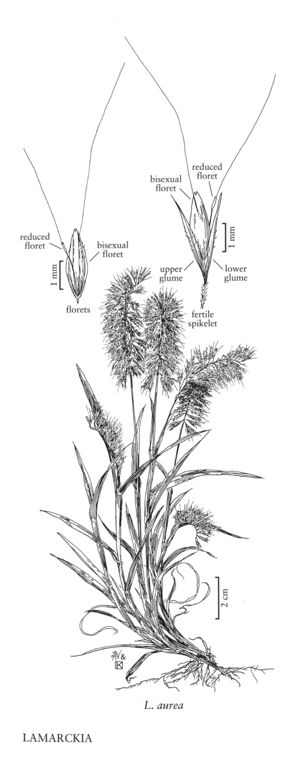Difference between revisions of "Lamarckia aurea"
FNA>Volume Importer |
imported>Volume Importer |
||
| (6 intermediate revisions by 2 users not shown) | |||
| Line 26: | Line 26: | ||
-->{{#Taxon: | -->{{#Taxon: | ||
name=Lamarckia aurea | name=Lamarckia aurea | ||
| − | |||
|authority=(L.) Moench | |authority=(L.) Moench | ||
|rank=species | |rank=species | ||
| Line 33: | Line 32: | ||
|basionyms= | |basionyms= | ||
|family=Poaceae | |family=Poaceae | ||
| + | |illustrator=Linda Ann Vorobik;Karen Klitz | ||
| + | |illustration copyright=Utah State University | ||
|distribution=Calif.;Ariz.;Pacific Islands (Hawaii);Tex. | |distribution=Calif.;Ariz.;Pacific Islands (Hawaii);Tex. | ||
|reference=None | |reference=None | ||
| Line 38: | Line 39: | ||
|publication year= | |publication year= | ||
|special status= | |special status= | ||
| − | |source xml=https:// | + | |source xml=https://bitbucket.org/aafc-mbb/fna-data-curation/src/200273ad09963decb8fc72550212de541d86569d/coarse_grained_fna_xml/V24/V24_695.xml |
|subfamily=Poaceae subfam. Pooideae | |subfamily=Poaceae subfam. Pooideae | ||
|tribe=Poaceae tribe Poeae | |tribe=Poaceae tribe Poeae | ||
Latest revision as of 16:24, 11 May 2021
Culms (5)10-40 cm. Ligules 3-10 mm; blades 2.5-11(20) cm long, 2.5-7.5 mm wide. Panicles 2-8 cm long, 0.9-3.2 cm wide; branches 1-2 cm, with a few scattered, whitish hairs. Fertile spikelets 2.6-4.2 mm; lower rachilla internodes about 1 mm, glabrous; upper rachilla internodes 1.4-2.2(2.6) mm, puberulent or glabrous, sometimes scabrous; glumes 2.6-4.2 mm, bisexual florets 2.4-3 mm, minutely bifid, teeth shorter than 0.2 mm, apices awned, awns 5-7.2 mm; anthers 0.4-0.7 mm; rudimentary florets 0.4-0.6 mm, awns 4-5(7) mm. Sterile spikelets 6-9 mm; lemmas 1-2 mm. Caryopses 1-2 mm. 2n = 14.
Distribution
Calif., Ariz., Pacific Islands (Hawaii), Tex.
Discussion
Lamarckia aurea grows on open ground, rocky hillsides, and in sandy soil, at elevations from sea level to 700 m. Within the Flora region, it is known only from the southwest. It is an attractive, but rather weedy species.
Selected References
None.
